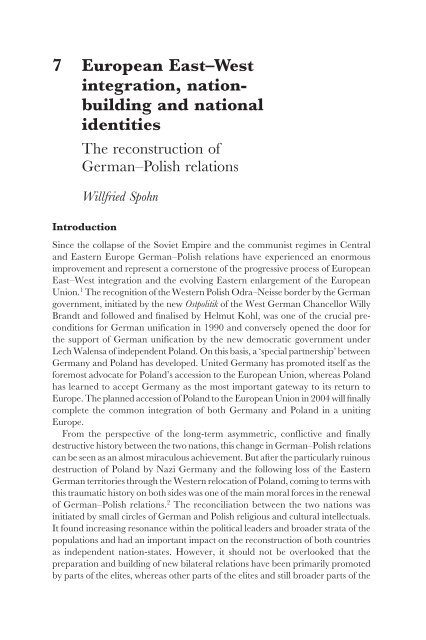Europeanisation, National Identities and Migration ... - europeanization
Europeanisation, National Identities and Migration ... - europeanization
Europeanisation, National Identities and Migration ... - europeanization
You also want an ePaper? Increase the reach of your titles
YUMPU automatically turns print PDFs into web optimized ePapers that Google loves.
7 European East–West<br />
integration, nationbuilding<br />
<strong>and</strong> national<br />
identities<br />
The reconstruction of<br />
German–Polish relations<br />
Willfried Spohn<br />
Introduction<br />
Since the collapse of the Soviet Empire <strong>and</strong> the communist regimes in Central<br />
<strong>and</strong> Eastern Europe German–Polish relations have experienced an enormous<br />
improvement <strong>and</strong> represent a cornerstone of the progressive process of European<br />
East–West integration <strong>and</strong> the evolving Eastern enlargement of the European<br />
Union. 1 The recognition of the Western Polish Odra–Neisse border by the German<br />
government, initiated by the new Ostpolitik of the West German Chancellor Willy<br />
Br<strong>and</strong>t <strong>and</strong> followed <strong>and</strong> finalised by Helmut Kohl, was one of the crucial preconditions<br />
for German unification in 1990 <strong>and</strong> conversely opened the door for<br />
the support of German unification by the new democratic government under<br />
Lech Walensa of independent Pol<strong>and</strong>. On this basis, a ‘special partnership’ between<br />
Germany <strong>and</strong> Pol<strong>and</strong> has developed. United Germany has promoted itself as the<br />
foremost advocate for Pol<strong>and</strong>’s accession to the European Union, whereas Pol<strong>and</strong><br />
has learned to accept Germany as the most important gateway to its return to<br />
Europe. The planned accession of Pol<strong>and</strong> to the European Union in 2004 will finally<br />
complete the common integration of both Germany <strong>and</strong> Pol<strong>and</strong> in a uniting<br />
Europe.<br />
From the perspective of the long-term asymmetric, conflictive <strong>and</strong> finally<br />
destructive history between the two nations, this change in German–Polish relations<br />
can be seen as an almost miraculous achievement. But after the particularly ruinous<br />
destruction of Pol<strong>and</strong> by Nazi Germany <strong>and</strong> the following loss of the Eastern<br />
German territories through the Western relocation of Pol<strong>and</strong>, coming to terms with<br />
this traumatic history on both sides was one of the main moral forces in the renewal<br />
of German–Polish relations. 2 The reconciliation between the two nations was<br />
initiated by small circles of German <strong>and</strong> Polish religious <strong>and</strong> cultural intellectuals.<br />
It found increasing resonance within the political leaders <strong>and</strong> broader strata of the<br />
populations <strong>and</strong> had an important impact on the reconstruction of both countries<br />
as independent nation-states. However, it should not be overlooked that the<br />
preparation <strong>and</strong> building of new bilateral relations have been primarily promoted<br />
by parts of the elites, whereas other parts of the elites <strong>and</strong> still broader parts of the



